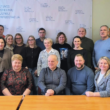(Minsk, 3 March 2016) All leaders joined in the photo-action in the hotel in Minsk. We wanted to send a message. No to the commercialization of health care and of social protection. No to privatization. Our health is not for sale. With our participation in the photo we kicked off the preparations for the EPSU led action to support the right to access to health care. This will be the message that will sound loud on 7 April in Brussels and elsewhere. Unions and other organisations will underline our demands for:
Quality care, and against austerity policies that cut in funding for health and other care. ![]() Public investment to have sustainable care and social security systems. Cuts in public funding make these systems more fragile and work more precarious. Whereas every Euro invested in health care delivers many more in growth and quality of life.
Public investment to have sustainable care and social security systems. Cuts in public funding make these systems more fragile and work more precarious. Whereas every Euro invested in health care delivers many more in growth and quality of life. ![]() Decent pay and conditions. Austerity policies have led to cuts in staff in some countries. This increases the workload. Governments have sought to impose wages freezes leaving nurses, doctors, medical and other staff behind. Homecarers, those delivering elderly care, health care assistants, nurses, junior and other doctors, cleaners are standing up for better pay and recognition of skills and qualifications.
Decent pay and conditions. Austerity policies have led to cuts in staff in some countries. This increases the workload. Governments have sought to impose wages freezes leaving nurses, doctors, medical and other staff behind. Homecarers, those delivering elderly care, health care assistants, nurses, junior and other doctors, cleaners are standing up for better pay and recognition of skills and qualifications. ![]() Health, social and other publics services out of trade agreements like CETA, TTIP and TISA. Keeping those services in will lead to cut-throat competition over the backs of patients and workers.
Health, social and other publics services out of trade agreements like CETA, TTIP and TISA. Keeping those services in will lead to cut-throat competition over the backs of patients and workers.
On the 7th of April, World Health Day, users, professionals, and many others will stand up for quality care. Together with the Belgian affiliates and others, EPSU will organize several public events to underline our demands in Brussels.
The unions that joined were participating in the North East European constituency meeting. We were welcomed by Robert Chasnoits, the president of the health workers trade union of Belo-Russian. Colleagues shared their experiences, concerns and actions to improve the well-being of workers and communities. With a full agenda, the colleagues considered: ![]() Social and economic developments in their countries.
Social and economic developments in their countries. ![]() Attacks on Trade union rights and changes to labour codes in several countries. Most of these changes seek to weaken the voice of workers.
Attacks on Trade union rights and changes to labour codes in several countries. Most of these changes seek to weaken the voice of workers. ![]() The next PSI Congress in October 2017. Proposals for changes to the constitution of the PSI were considered and a first exchange on priorities for the next Congress period too place.
The next PSI Congress in October 2017. Proposals for changes to the constitution of the PSI were considered and a first exchange on priorities for the next Congress period too place. ![]() EPSU priorities for 2016 and forthcoming actions and events. EPSU’s work on trade and taxation was commented up.
EPSU priorities for 2016 and forthcoming actions and events. EPSU’s work on trade and taxation was commented up.
The Deputy-Minister for health explained the priorities for the country. He underlined the importance of working with the trade union. The vice-President of the Confederation explained the focus on organizing, the creation of new local work place trade unions. There are concerns about the economic situation in Belo-Russia. The country is seeking loans from the IMF as well as the Eurasian Development Fund. It is not clear yet which conditions are attached. Prices for basic services (energy, water…) are already increasing.
The unionists also met with the local trade union of the cardiological centre. The leader of the local union explained the work the union does to promote and protect the interests of the workforce. The sectoral agreement between the national union and the ministry of health covers all work places. The local union primarily focuses on health and safety. It negotiates on additional leave and other benefits. Whereas the overall level of density in the health sector in Belo-Russia is over 95%, in this new center about 60% of workers are member of the union. The trend is upward. Staff showed the modern imported German equipment. It demonstrated dazzling 3-dimensional pictures of heart and veins The imagery would predict cardiovascular problems explained a member of the center’s staff.
The unions expressed their solidarity for the junior doctors in the UK. The doctors will strike on 9 March again. The junior doctors are fighting for better regulations to deal with overtime and weekend work. The UK conservative government seeks to impose a contract, worsening pay and conditions. The EPSU health and social services unions recognize the importance of their fight. Long working hours have a negative impact on patient safety. In many countries junior doctors earn low salaries and have to work longer hours. Leaders of several unions also draw parallels regarding financing. The UK government’s austerity policies impact negatively on the public health system. Also the government of Latvia has starved the health services of funding. Comparatively it has the lowest % of GDP spend on health care. And while the European Commission’s country specific recommendations have recommended higher spending to ensure all have access to health, the European Commission is not applying enough pressure on Latvia to make it happen. Unions and other organisations have organized actions to put pressure on the government. They have had results as salaries will increase in 2016.
The meeting took place in Minsk, BeloRussia, 2-3 March 2016. The meeting brought together leaders of 21 public service unions from Armenia, Belo-Russia, Estonia, Georgia, Latvia, Lithuania and Ukraine. They were joined by representatives of the regional trade union organisations of the Belo-Russian health workers union and representatives of the Belo-Russian state and utility workers trade unions. The EPSU General Secretary attended the meeting.
A report of 2 March and report of 3 March of the meeting in the trade union newspaper in (Belo-) Russian




